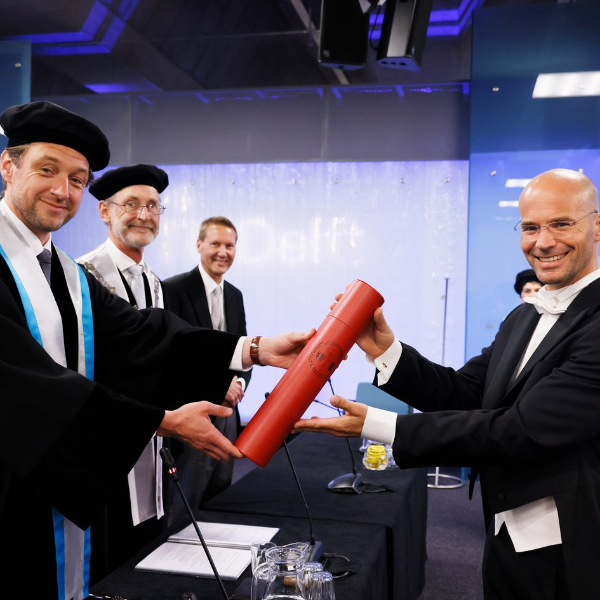Arny Lengkeek obtains PhD for dyke-sheet piling interaction

Arny Lengkeek obtains PhD for dyke-sheet piling interaction
Arny Lengkeek, senior geotechnical engineer at Witteveen+Bos, obtained his PhD on 17 June at TU Delft’s Civil Engineering & Geosciences faculty. Arny successfully defended his thesis on ‘Testing and modelling of sheet pile reinforced dykes on organic soils’.
Subsidence, rising sea levels and increasing rainfall and river discharge all present challenges to our country’s ability to maintain existing flood defences at the required safety level.
The level of existing earth dykes is often raised gradually to achieve this safety level. Raising a dyke, however, requires the base to be widened; something that is often restricted by the presence of existing buildings and adjacent land having a designated purpose. These dykes can be reinforced using alternative structures such as sheet piling. Another specific dyke reinforcement challenge in the Netherlands is that the subsoil at many dykes is soft; it often consists of organic clay and peat.
Arny Lengkeek’s research focused on improving two global dyke stability assessment aspects in the Netherlands: 1. the modelling of organic soil types and 2. dyke reinforcement using perimeter sheet piling structures. The models were validated using full-scale buckling tests in Eemdijk. The tests aimed to understand the interaction between the dyke and sheet piling and improve the design.
Research questions included:
- How does a dyke system reinforced with sheet piling behave when it collapses?
- How does this compare to an earth dyke?
- To what extent can this be modelled?
The approaches presented in the study are expected to result in improved economic design as well as a better understanding of the dykes’ failure mechanism of macro-stability, both with and without perimeter sheet piling structures.
More information?



